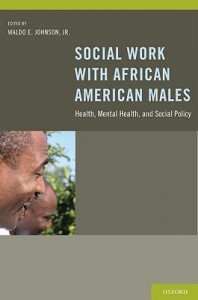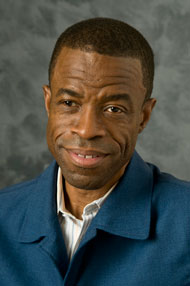Book Examines African American Males, Social Work Practice
Waldo Johnson Jr., DSW, hopes his new book will provide an updated, 21st century perspective on social work practice and African American males, especially younger black males.
“Social Work With African American Males: Health, Mental Health, and Social Policy” ( Oxford University Press), is a compilation of writings from about 32 social workers, nurses and criminal justice experts that offer fresh views on myriad social issues affecting black males, including depression, fatherhood, education and mental illness.
The book contributors — including M. Daniel Bennett Jr., MSW, PhD, and Michael Lindsey, MSW, an assistant professor at the University of Maryland School of Social Work — represent some of the youngest and brightest minds in social work.
“They do represent the next generation of scholars and their cutting-edge work,” said Johnson, who is associate professor at the University of Chicago School of Social Service Administration.
The book grew out of a conference Johnson held at the University of Chicago five years ago. Johnson was interested in how the social work profession served African American males and turned to some of the conference participants to assemble a book to answer this question.
 Johnson said for decades U.S. social welfare policy has focused more on mothers, children, the elderly and the infirm. Men and especially African American males were neglected, although racism and the vestiges of segregation have put many black men on the lower rungs of America’s economic ladder, he said.
Johnson said for decades U.S. social welfare policy has focused more on mothers, children, the elderly and the infirm. Men and especially African American males were neglected, although racism and the vestiges of segregation have put many black men on the lower rungs of America’s economic ladder, he said.
“We continue to have this type of social welfare policy that views men as undeserving,” he said.
“Social Work With African American Males” puts more focus on the social welfare needs of black men. For instance, past books on young black males may have focused on the high level of African American high school drop outs, Johnson said.
However, “Social Work With African American Males” examines a disturbing modern trend: young black men are more likely to be expelled or suspended from schools, making it more likely some will end up in the juvenile justice system, he said.
And Bennett at the University of Maryland wrote about how the daily hassles black men experience, including violence and harassment from authorities, may make some more susceptible to depression, Johnson said.
Still, the book does not just focus on the negative social trends. Joseph Richardson Jr., an assistant professor in the African-American studies department at the University of Maryland at College Park, wrote about how uncles and other male kin and family friends in black communities often pitch in to help raise and mentor young black men.
“The role that uncles play often gets ignored,” Johnson said. “A researcher or someone outside of African American culture may not recognize the role of kin.”
“Social Work With African American Males” is available on Amazon.com. To learn more click here. The National Association of Social Workers is also dedicated to social justice for all, no matter what their race, sex, sexual orientation, or income level. To learn more visit NASW’s Diversity and Equity Web page by clicking here.
| Leave A CommentAdvertisement
2 Comments
Leave a Comment
You must be logged in to post a comment.




Hello – I am the editor of an email newsletter for the Canadian
Association of Nephrology Social Workers. We are a small professional
organization with about 100 members across Canada. Our newsletter is
sent out to members free of charge, and it is archived on our webpage at
http://www.cansw.org . We do not accept paid
advertising. I am seeking permission to reprint your item
“Book Examines African American Males, Social Work Practice
” that ppeared online Dec.29, 2010 (GWright). I think would be of great interest
to our members.
Regards,
Lyle Stockwell
Thank you for your contribution to the profession. One day I hope to see more than one or two Afican American men working in more social service organizations.